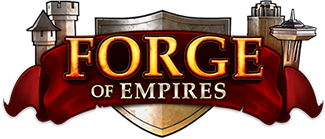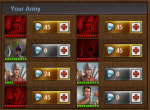Exército e batalhas
Whoever wants to forge an empire must fight. In Forge of Empires, the military plays an important role. You can use your units to attack other players or conquer provinces on the Continent map. To go into battle, you first need units. You put these into slots in your military buildings. In your Army Management you can manage the units and add your attacking army or defending army.
Army Management
The army management screen is an efficient way to manage your units. You can mark units to defend your city and the same units can even be used in attack. The units marked with a blue highlight are in your defending army and they defend your city. You should always try to put as many troops as possible into your army. Fellow players have to defeat them when they attack you. But fear not: even if your opponent is victorious, all defenders will be healed and revived to full strength immediately after any battle to defend your city.
If you want to attack another player or an enemy on the Continent map, you can choose the units in your attacking army before the battle begins. These can be the same units you’ve marked as defenders of your city. However, your units are not protected when you attack and can therefore be destroyed or damaged... so be careful!
Unit Types
In each age, there are five different military buildings that produce the different units of that time. The units differ in their type: There are fast units, light and heavy units and units with short or long ranged attacks.
- Fast units have a good range of movement, but they cannot take much damage. They are a great way to take out ranged units.
- The light units are genuine all-rounders: they are fast, inflict good damage and can withstand a lot. They are best at intercepting enemy cavalry.
- The heavy units are slow and heavily armored. They are formidable opponents when they make it into close combat; there they outmatch any other unit.
- Short ranged units are fast and can attack from a distance, and their attack does significant damage. However, they cannot defend themselves and are easy prey for all units which manage to attack them in close combat.
- The long ranged units are lost in close-range combat. They are very slow and have a weak attack. Their big advantage is that they can cover almost the entire battle map with their attack and are able to selectively attack almost every unit.
Movement and Attack
The battle is fought in rounds. Basically, each unit moves and attacks once per round. They move according to their movement points, but each type of terrain will cost a differing amount. Directly after movement, if there is an opponent within their reach, the units can attack. Melee and fast units have to attack into an adjacent field, while ranged units can shoot at an enemy within their range.
There is no retaliation to fear from ranged attacks; however, in close-ranged battle, attacked fast and melee units can defend themselves. It works like this: First, the attacker does its damage, then the one being attacked hits back. However, there is only one counter-attack per round: even the strongest unit can be defeated by a swarm of enemies this way.
Damage
Each unit has a maximum of ten life points. The amount of damage points an attack deals is calculated using the current life points and the attack value of the attacker, the defense value of the attacked, modifiers for terrain, other bonuses (some units get bonuses if they fight against units of a particular type) and a random factor. Thus, a unit with a high attack rating deals more damage, and an uninjured unit inflicts more than a wounded one. On the other hand, high defense means good armor – the unit takes less damage. If a unit loses all its life points, it is destroyed.
Terrain
On the battle map, there are different types of terrain. Forest, bushes, rocks, small hills, plains and swamps are some of them. Terrain has two different effects in the game: Firstly, it affects movement. Water areas are impassable, and other types of terrain costs extra movement points when they are crossed. On the other hand, terrain can give battle bonuses: light melee units get defense bonuses in bushes and forests, heavy melee units are better protected in plains, long-range units receive an attack bonus when they shoot from hills, whereas those with short range attacks deal more damage standing on rocks. Only fast units do not receive benefits through the terrain.
Buffs
The stats of units might get further influenced by a percentile boost. While on some provinces of the Continent map all enemy units in it gain a percentage bonus to their attack and defense stats (easily seen in the sector view as small shield icons on top of the unit images), there are two different buffs that can affect the armies of the players, both of which are accumulated from certain buildings like a few of the Great Buildings:
- Defense boost: All units in the defending army of this player get a bonus to their defense stat only, which means they take less damage when attacked.
- Military boost: All units in the attacking army of this player get a bonus to both their attack and the defense stats, which means they take less damage and deal more.
Special Skills
There are some units in the game that add a further layer of tactical options to the players by featuring special skills. Right now the following skills are in the game:
- Blast: This skill is only found on units with ranged attacks. A unit with blast deals more damage for every field it is closer to its target.
- Hides in (terrain): A unit with this skill can only be attacked from adjacent fields, as long as it stays in the specified terrain.
- Secret Identity: A unit with this skill completely ignores the first attack it takes. Instead, it transforms into an undamaged copy of another unit of your army, that does not have secret identity. If no such unit is left, the attacked unit gets removed from battle instead.
- Chivalry: The skill is used by the High Middle Age Knights and Late Middle Age Heavy Knights (with Chivalry values of 3 and 5 respectively). The skill increases attack and defense when this is the only unit with chivalry in the army.
- Last Stand: A unit with this skill gains attack and defense bonus for every unit with Last Stand that has been killed in the same battle.
- Dug in: Units with this skill gains defense bonus if the attacker is a certain amount of fields away. The distance varies upon the unit.
Rapid deployment: Units with this skill start the battle in a random location towards the center of the map and act before any other unit.
Healing
Is the battle over and your units have been damaged? No problem – they heal automatically over time, one life point at a time. Units that were destroyed in battle do not heal. Their corresponding slot in military building is freed again and you can recruit a new unit there.
Y
ou also have a possibility to heal your units in your Army Management screen using Diamonds.
You have a chance to resurrect a fallen unit right after a battle, using Diamonds – it can be worthwhile, especially if you've lost "unattached" units that are not from slots in military buildings but obtained through quests or events - a unit that you can't replace otherwise.



